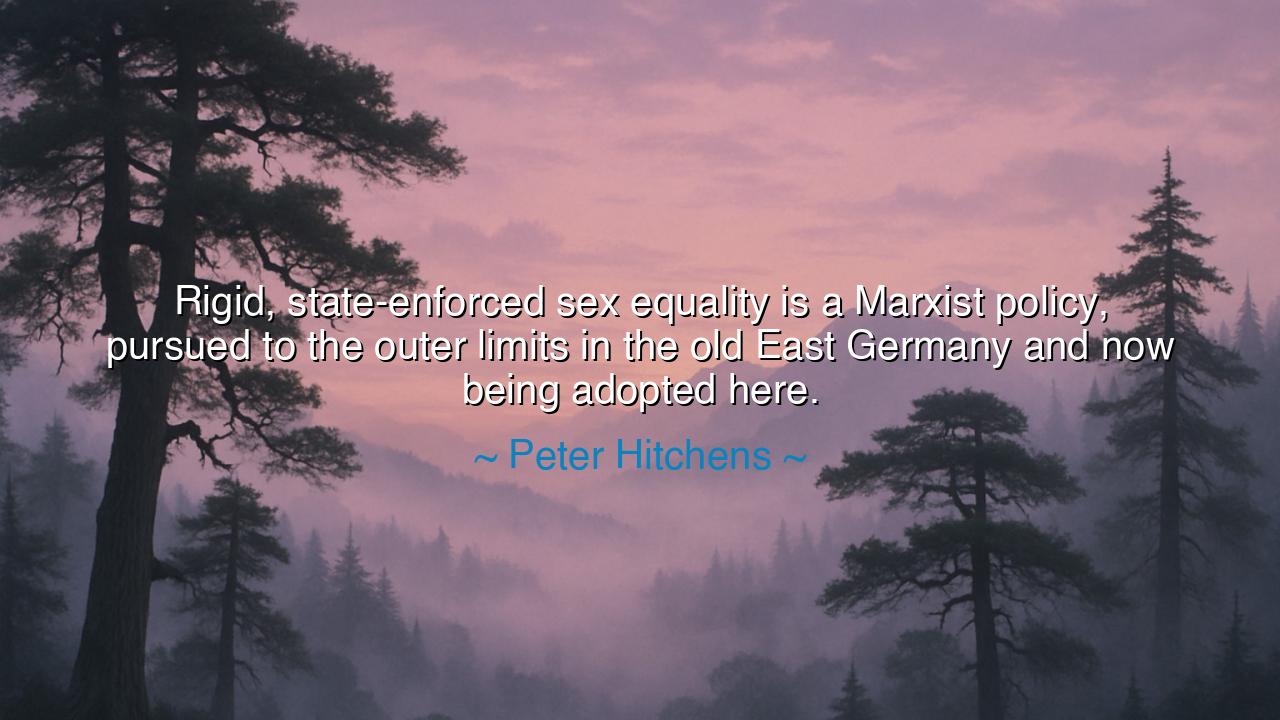
Rigid, state-enforced sex equality is a Marxist policy, pursued
Rigid, state-enforced sex equality is a Marxist policy, pursued to the outer limits in the old East Germany and now being adopted here.






Peter Hitchens, with the sternness of a prophet and the caution of one who has seen the tides of history, declared: “Rigid, state-enforced sex equality is a Marxist policy, pursued to the outer limits in the old East Germany and now being adopted here.” In this declaration he does not oppose equality itself, but warns against its distortion when imposed by force, stripped of freedom, and reshaped into an instrument of ideology. His words strike not against justice, but against coercion—the danger that a noble aim, when enforced rigidly by the state, becomes tyranny disguised as virtue.
When he names sex equality, Hitchens points to a truth all men and women instinctively know: that each soul, whether male or female, is equal in dignity and worth. Yet when he describes it as rigid and state-enforced, he signals a transformation of this truth into something unnatural—an artificial leveling that denies human difference, forcing men and women into identical molds, rather than allowing them to flourish in their unique strengths. His warning echoes the ancient voices who cautioned that even justice, if twisted into extremity, becomes injustice.
The reference to Marxist policy reveals the origin of his thought. In the regimes of the twentieth century, especially in the old East Germany, equality was not a field where freedom could bloom but a battlefield where the state dictated every role. Women were compelled into the workforce not as a matter of choice, but by decree, their domestic roles diminished and their individuality absorbed into the collective. Men, too, were bound to the same machinery, their familial responsibilities and spiritual callings subordinated to the demands of production. What began as a vision of liberation became a yoke of uniformity, as unforgiving as iron.
History offers us clear examples of this. In East Germany, women were praised as symbols of progress for working in factories and on farms, but their lives were burdened with double expectation: laborer by day, mother by night. The state promised equality, but it delivered exhaustion. Their choice was stripped away, and the equality they were granted was not freedom but command. Thus, the noble word “equality” became a mask for control, binding both sexes in the same chains. This is what Hitchens names when he speaks of policy “pursued to the outer limits.”
The meaning of his warning is that true equality cannot be imposed from above by decree, nor achieved by denying the reality of difference. Instead, it must grow from within, nurtured by respect, justice, and the freedom to choose. For the state that attempts to erase distinctions by force does not create harmony—it breeds resentment, conformity, and despair. Like the ancients who feared tyranny more than anarchy, Hitchens reminds us that even the pursuit of justice must be guided by wisdom, lest it become an idol that devours its worshipers.
The lesson for us is sharp: do not confuse equality with sameness, nor freedom with compulsion. Men and women are equal in worth, but not identical in nature; to deny this is to deny truth itself. Seek justice, but let it be voluntary, rooted in the soil of liberty, not hammered into place by state decree. Where freedom exists, men and women can pursue education, labor, and love as partners, complementing one another. But where the state dictates uniformity, both lose the dignity of choice, and equality becomes yet another form of bondage.
Therefore, let us act with discernment. Defend the equal worth of men and women, but resist all attempts to erase difference by command. Encourage opportunity, but do not bow to ideologies that demand sameness as the price of justice. Teach your children that equality is sacred when born of freedom, but destructive when wielded as a weapon of control. For the wisdom of the ages is this: the pursuit of justice must always walk hand in hand with liberty, or it will cease to be justice at all.
Thus, Peter Hitchens’s words ring as a warning for our time: “Rigid, state-enforced sex equality is a Marxist policy.” They remind us that the noblest ideals can be corrupted when imposed without love, without choice, without respect for truth. If we heed his caution, we may yet preserve both freedom and equality—not as enemies locked in struggle, but as allies building a society where men and women walk side by side, in dignity, difference, and mutual respect.






AAdministratorAdministrator
Welcome, honored guests. Please leave a comment, we will respond soon